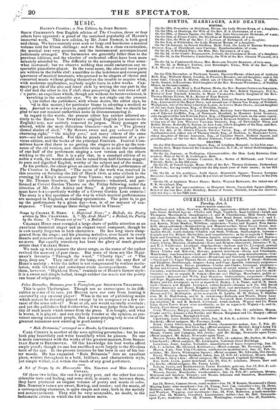MUSIC.
BAVDN'a Creation; a Mio Edition, by JOHN BISMOP.
SINCE CLEMENTI'S first English edition of The Creation, three or four others have appeared ; a proof of the sustained popularity of HAYDN'S immortal work. This new edition, by Mr. JOHN BISHOP, is both good
and cheap. We have scarcely ever seen so large and handsome a musical volume sold for fifteen shillings ; and we find, on a close examination,
the musical text very accurate, and the instrumental accompaniment judiciously arranged. The harmonies are generally fuller than in the previous editions, and the niceties of orchestral effect have been more minutely attended to. The difficulty to the accompanist is thus some- what increased ; but we observe nothing that could embarrass any re- spectable pianoforte-player. In the vocal score, the alto and tenor parts are written in the treble clef; a sacrifice to the indolence and consequent ignorance of musical amateurs, who pretend to be singers of choral and concerted music without giving themselves the trouble to acquire what, with moderate application, anybody might learn in a few weeks. CLE- KENT' got rid of the alto and tenor clefs by writing the one part in the G clef and the other in the F clef; thus preserving the real notes of all l parts ; an expedient which, though not without its inconveniences, is evolting to the scientific eye. We do not single out the present (or rather the publishers, with whose desire, the editor says, he in this matter,) for particular blame in adopting a method so
mm, sorted to now-a-days in popular publications ; but we should be glad t see our musical authorities unite in discountenancing it.
In regard to the words, the present editor has neither adhered en- tirely to the Baron VON SWIETEN'S original English (or meant-to-be English) text, nor entirely removed its jargon. Many passages are altered, while the most ridiculous blunders-such as " The gloomy dismal shades of dark," " By flowers sweet and gay enhanced is the charming sight," " On mighty pent," and many others of the same sort-are left untouched. For this he pleads the precedent of a pre- vious edition, and the books of the principal Festivals. Festival Com- mittees know that there is no getting the singers to give up the non- sense of the old version, and therefore retain it, to avoid the confusion of one half of the performers singing a new version and the others sticking to the old. But it is a pity that, in a standard edition of so noble a work, the words should not be raised from half-German doggrel to pure and dignified English, worthy of the subject and of the music. In his preface, the editor gives an anecdote of the first performance of The Creation in England. "The score of the work was received in this country on Saturday the 22d of March 1800, at nine o'clock in the evening, by a King's messenger from Vienna ; was copied into parts, by Mr. Thomas Goodwin, for 120 performers ; rehearsed, and per- formed at Covent Garden Theatre on the Friday following, under the direction of Mr. John Ashley and Sons." A pretty performance it must have bce]-perfectly worthy of a Covent Garden Lent oratorio ! The story is a fine specimen of the way in which musical performances are managed in England, as trading speculations. The point is, to get up the performance by a given day-how, is of no manner of con- sequence. " They manage these things better in France."






























 Previous page
Previous page